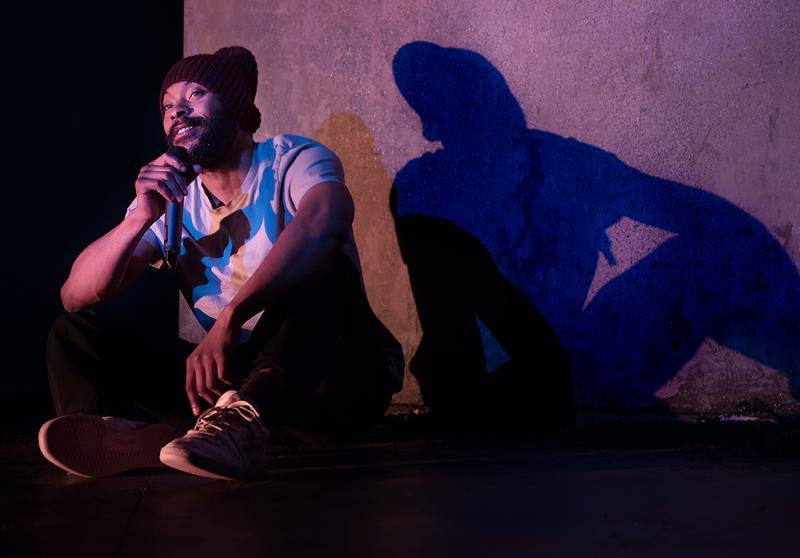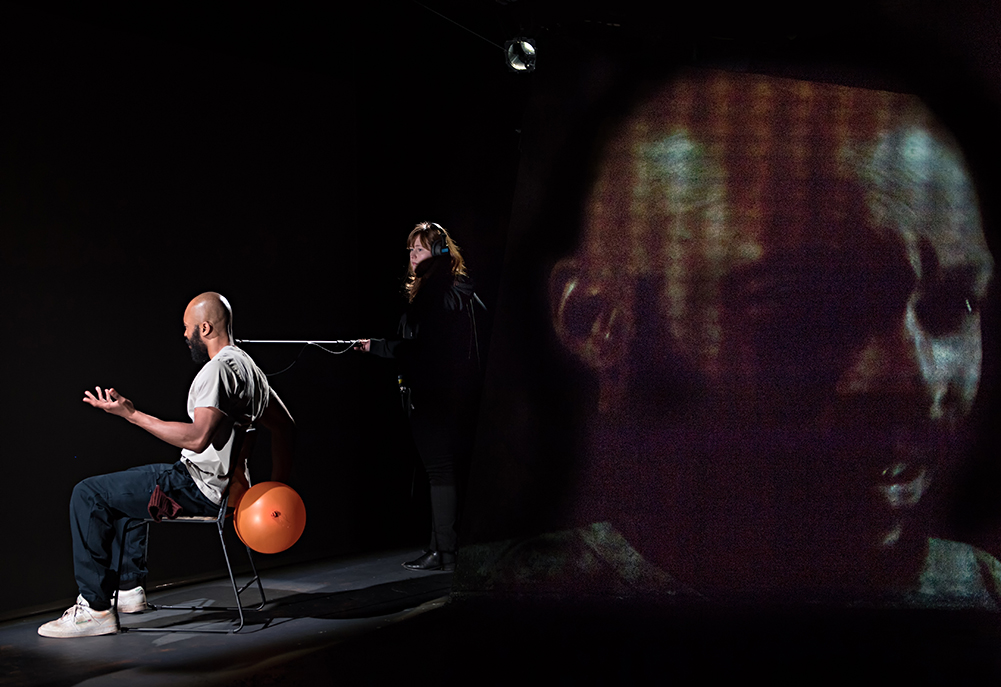Misty, Bush Theatre review - powerful meditation on how we tell stories | reviews, news & interviews
Misty, Bush Theatre review - powerful meditation on how we tell stories
Misty, Bush Theatre review - powerful meditation on how we tell stories
Arinzé Kene writes and stars in a witty, hard-hitting play about race and culture in modern London

Arinzé Kene is having a bit of a moment. He won an Evening Standard Film Award for The Pass opposite Russell Tovey in 2016, is about to appear in a BBC drama with Paddy Considine, and has just finished lending his lovely tenor to Conor McPherson’s Girl from the North Country in the West End.
Clocking in at a tight two hours, Misty begins, true to its title, with a lot of fog. A thick green mist moves through the auditorium, wrapping around a single microphone stand centre-stage. There are two platforms on either side, staffed by the two musical directors, Shiloh Cooke on drums and Adrian McLeod on synths. The songs that thread through the play are snappy, defiant and full of heart, but the two musicians feel under-used.
Where they really shine is when they join the action onstage, acting out the voicemails that Arinzé’s friends, Raymond and Donna, leave for him. They are harassed parents, the cries of their infant daughter ingeniously reproduced onstage as they berate Arinzé for writing a "black play". What exactly a "black play" is, and the question of why a play written by a black playwright and performed by black actors cannot simply be a play, lies at the heart of Misty.
The action cuts neatly between scenes like this, featuring a fictionalised version of the writer, and the story of an unnamed young black man (known only as The Virus) as he is hounded for a crime he did not mean to commit. The second storyline is about gentrification - “modern-day colonisation”, as Kene calls it - and though it’s a familiar idea, he makes it sing, expressing the anguish of black neighbourhoods forced out by “flat-white-sipping yoga addicts” with poignancy, wit and charm. The show bills itself as a mixture of "gig theatre, spoken word, live art and direct address", but the most obvious parallel for the urgent rhythm of every line is Shakespeare. This is somewhat ironic, given one of Kene’s outbursts in the second act (“Fuck Shakespeare!”), but no less true for that. If London (never named, but heavily hinted at) is, as Kene describes it, an organism, his words are its beating heart. Sometimes they miss the mark, but he really knows how to end an act. The last scene of both halves is powerful, shocking and deeply moving; the last track, a freestyle rap where Kene pours his heart out, shirtless and sweating, is a triumphant, beautiful piece of theatre - “with a capital F”, as he reminds us. He’s a captivating performer, even if he occasionally seems to lose himself in his own flow. He slips between the fictionalised version of himself and The Virus effortlessly, while still defining the characters sharply from one another - a burgundy beanie and a subtle change in the way he moves is all it takes.
This is somewhat ironic, given one of Kene’s outbursts in the second act (“Fuck Shakespeare!”), but no less true for that. If London (never named, but heavily hinted at) is, as Kene describes it, an organism, his words are its beating heart. Sometimes they miss the mark, but he really knows how to end an act. The last scene of both halves is powerful, shocking and deeply moving; the last track, a freestyle rap where Kene pours his heart out, shirtless and sweating, is a triumphant, beautiful piece of theatre - “with a capital F”, as he reminds us. He’s a captivating performer, even if he occasionally seems to lose himself in his own flow. He slips between the fictionalised version of himself and The Virus effortlessly, while still defining the characters sharply from one another - a burgundy beanie and a subtle change in the way he moves is all it takes.
Crucially, all the opposition that Arinzé faces to the play comes from black people: his friends; his sister (portrayed by a young girl with a big voice, slightly grating at times) who is implied to have emigrated to Africa; his producer and agent, whose voices are provided by audio clips of Morgan Freeman and Whoopi Goldberg. In this way, it is made clear that criticism of black playwrights and their work is often loudest from their own communities. Kene raises an important point: should media created by and starring black people only portray the negative aspects of black experience? He implies that the "black suffering" trope is common because it is popular with white audiences, and while the audience at the Bush is usually significantly more diverse than most London theatres, Kene is clearly addressing the white-dominated industry as a whole. “I just wanna write a play, man,” he laments, late in the second half. “Can a play from a person like me just be a fucking play already?” Given this multi-layered array of pitfalls, it seems a miracle that Kene ever wrote Misty. Thank God he did.
rating
Explore topics
Share this article
The future of Arts Journalism
You can stop theartsdesk.com closing!
We urgently need financing to survive. Our fundraising drive has thus far raised £49,000 but we need to reach £100,000 or we will be forced to close. Please contribute here: https://gofund.me/c3f6033d
And if you can forward this information to anyone who might assist, we’d be grateful.

Subscribe to theartsdesk.com
Thank you for continuing to read our work on theartsdesk.com. For unlimited access to every article in its entirety, including our archive of more than 15,000 pieces, we're asking for £5 per month or £40 per year. We feel it's a very good deal, and hope you do too.
To take a subscription now simply click here.
And if you're looking for that extra gift for a friend or family member, why not treat them to a theartsdesk.com gift subscription?
more Theatre
 Hamlet, National Theatre review - turning tragedy to comedy is no joke
Hiran Abeyeskera’s childlike prince falls flat in a mixed production
Hamlet, National Theatre review - turning tragedy to comedy is no joke
Hiran Abeyeskera’s childlike prince falls flat in a mixed production
 Rohtko, Barbican review - postmodern meditation on fake and authentic art is less than the sum of its parts
Łukasz Twarkowski's production dazzles without illuminating
Rohtko, Barbican review - postmodern meditation on fake and authentic art is less than the sum of its parts
Łukasz Twarkowski's production dazzles without illuminating
 Lee, Park Theatre review - Lee Krasner looks back on her life as an artist
Informative and interesting, the play's format limits its potential
Lee, Park Theatre review - Lee Krasner looks back on her life as an artist
Informative and interesting, the play's format limits its potential
 Measure for Measure, RSC, Stratford review - 'problem play' has no problem with relevance
Shakespeare, in this adaptation, is at his most perceptive
Measure for Measure, RSC, Stratford review - 'problem play' has no problem with relevance
Shakespeare, in this adaptation, is at his most perceptive
 The Importance of Being Earnest, Noël Coward Theatre review - dazzling and delightful queer fest
West End transfer of National Theatre hit stars Stephen Fry and Olly Alexander
The Importance of Being Earnest, Noël Coward Theatre review - dazzling and delightful queer fest
West End transfer of National Theatre hit stars Stephen Fry and Olly Alexander
 Get Down Tonight, Charing Cross Theatre review - glitz and hits from the 70s
If you love the songs of KC and the Sunshine Band, Please Do Go!
Get Down Tonight, Charing Cross Theatre review - glitz and hits from the 70s
If you love the songs of KC and the Sunshine Band, Please Do Go!
 Punch, Apollo Theatre review - powerful play about the strength of redemption
James Graham's play transfixes the audience at every stage
Punch, Apollo Theatre review - powerful play about the strength of redemption
James Graham's play transfixes the audience at every stage
 The Billionaire Inside Your Head, Hampstead Theatre review - a map of a man with OCD
Will Lord's promising debut burdens a fine cast with too much dialogue
The Billionaire Inside Your Head, Hampstead Theatre review - a map of a man with OCD
Will Lord's promising debut burdens a fine cast with too much dialogue
 50 First Dates: The Musical, The Other Palace review - romcom turned musical
Date movie about repeating dates inspires date musical
50 First Dates: The Musical, The Other Palace review - romcom turned musical
Date movie about repeating dates inspires date musical
 Bacchae, National Theatre review - cheeky, uneven version of Euripides' tragedy
Indhu Rubasingham's tenure gets off to a bold, comic start
Bacchae, National Theatre review - cheeky, uneven version of Euripides' tragedy
Indhu Rubasingham's tenure gets off to a bold, comic start

Add comment